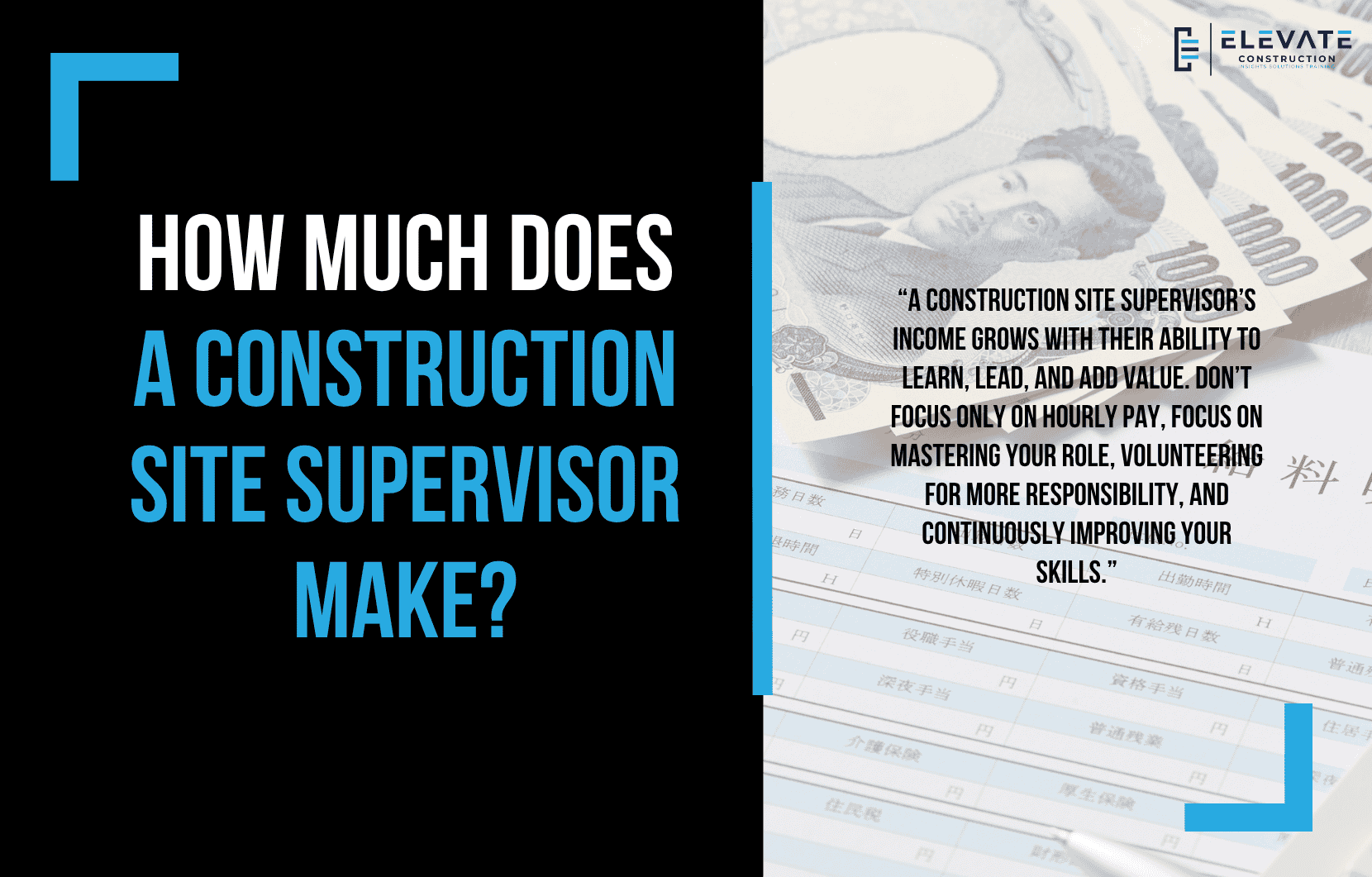How Much Does a Construction Site Supervisor Make?
How much does a construction site supervisor make and what can you do to increase your income in this role? In this blog, we’ll explore salary ranges across regions, the key skills that lead to higher pay, and the mindset shifts that help you grow your construction career beyond the supervisor level.
If you’ve ever wondered what the financial and professional path of a site supervisor looks like, this blog is for you.
Understanding the Title: Site Supervisor vs. Superintendent vs. Site Manager
The term site supervisor can mean different things depending on where you are. In Europe, the same position might be called a site manager or PM (project manager), while in the U.S. and Canada, superintendent is the more common title. In some cases, site supervisor might even refer to a foreman or lead craftsperson who oversees field work.
The point is, there’s no global standard. Just like the United States stubbornly sticks to the imperial system while much of the world uses metric, construction titles vary across regions. What matters most is understanding where your role fits within your local hierarchy.
Take the time to research where a site supervisor stands in your region’s structure, it will help you know what to expect in terms of salary and career progression.
Salary Ranges and Regional Differences
Across the U.S., site supervisors typically earn between $22 and $32 per hour, while in the U.K., the range is £19 to £25 per hour. However, location makes a big difference – salaries in places like California or Washington can be double those in Arizona, though living costs are also higher.
In my experience, highly competent crew leaders or field supervisors can earn $30 to $40 per hour, depending on their performance and reliability. But more importantly, your role as a site supervisor is often the launch pad for future promotions and pay increases.
Don’t let yourself get stuck where you are, use this position as a foundation to build upward.
Don’t Get “Too Good” to Move Forward
One of the most valuable lessons comes from Jerry Morganson, former chairman and CEO of Hensel Phelps:
“Don’t get too good and indispensable at something that you get stuck there.”
If you’re great at what you do, people may try to keep you where you are. But if you want to grow, you must be intentional about moving forward. Stay long enough to master your responsibilities, then seek the next challenge.
How to Progress: Reading, Training, and Volunteering
If you want to start earning more and accelerating your career, Jason recommends three consistent habits:
- Read books – Start with How to Win Friends and Influence People and Elevating Construction Superintendents. These two alone will open doors to more advanced leadership concepts and point you to even more transformative reads.
- Get certified and trained – Attend position-specific or union training programs. The world will pay you in direct proportion to your implemented training, not just credentials on paper.
- Volunteer for more – Step up to lead coordination meetings, develop short-term schedules, or take on extra responsibilities. Every time you volunteer, you learn, grow, and demonstrate leadership initiative.
Jason also highlights The Ideal Team Player by Patrick Lencioni, which introduces three traits that define great team members: humble, hungry, and smart. Live these values, and your growth will compound quickly.
Entry-Level vs. Experienced Pay
Jason explains that an experienced site supervisor can easily earn double what an entry-level person makes. Your growth depends on initiative. Jason himself began earning $14–$22/hour in the field, moved to $62,000/year as a field engineer, then rose to $95,000 as an assistant superintendent, $130,000 as a lead, and up to $350,000+ in director roles.
The takeaway: growth is exponential for those who learn, implement, and lead.
Overtime, Bonuses, and Career Structure
If you’re in a craft or hourly role, overtime is common and can significantly boost your income. Once you move to salaried positions, overtime typically disappears but that’s when bonuses start coming into play.
At higher leadership levels, compensation becomes increasingly performance-driven, and bonuses can be substantial.
Final Advice: Add Value Everywhere
Jason closes the blog with one simple but powerful principle:
“Add value. Add value. Add value – everywhere.”
Whether it’s at work, in your relationships, or in your personal life, focus on bringing value to every situation. The more value you create, the more opportunities will come your way.
Key Takeaway
A construction site supervisor’s income grows with their ability to learn, lead, and add value. Don’t focus only on hourly pay, focus on mastering your role, volunteering for more responsibility, and continuously improving your skills. The more initiative you show, the faster your career (and paycheck) will grow.
If you want to learn more we have:
-Takt Virtual Training: (Click here)
-Check out our Youtube channel for more info: (Click here)
-Listen to the Elevate Construction podcast: (Click here)
-Check out our training programs and certifications: (Click here)
-The Takt Book: (Click here)
Discover Jason’s Expertise:
Meet Jason Schroeder, the driving force behind Elevate Construction IST. As the company’s owner and principal consultant, he’s dedicated to taking construction to new heights. With a wealth of industry experience, he’s crafted the Field Engineer Boot Camp and Superintendent Boot Camp – intensive training programs engineered to cultivate top-tier leaders capable of steering their teams towards success. Jason’s vision? To expand his training initiatives across the nation, empowering construction firms to soar to unprecedented levels of excellence.
On we go

